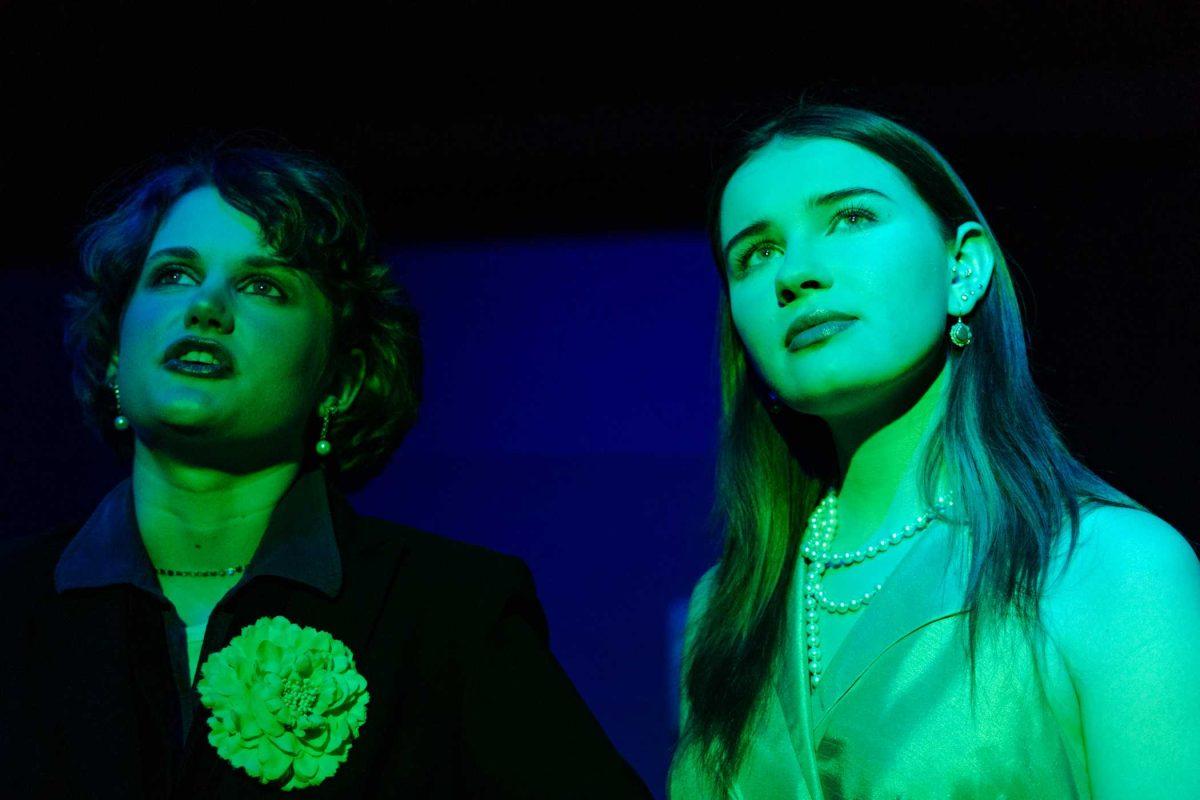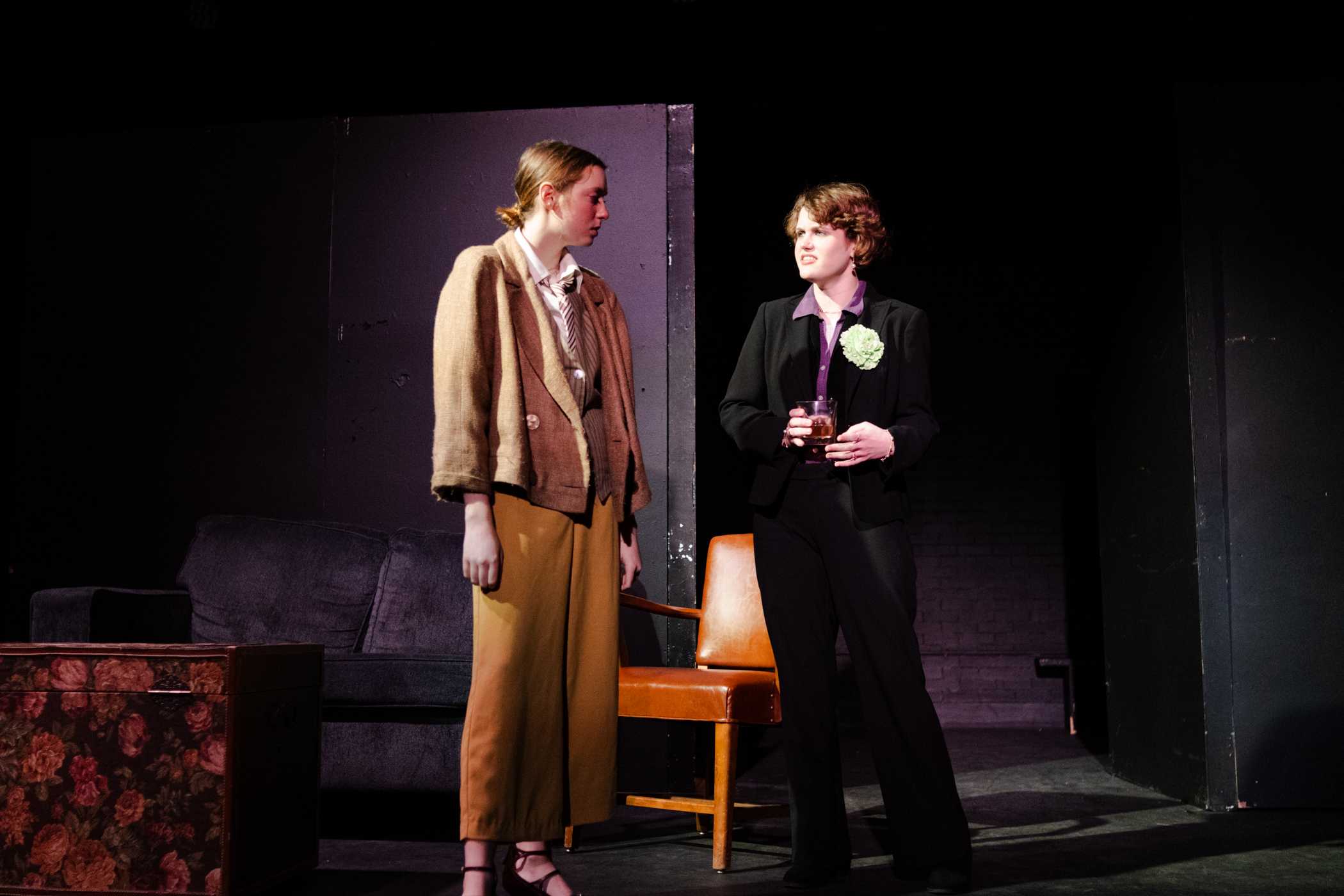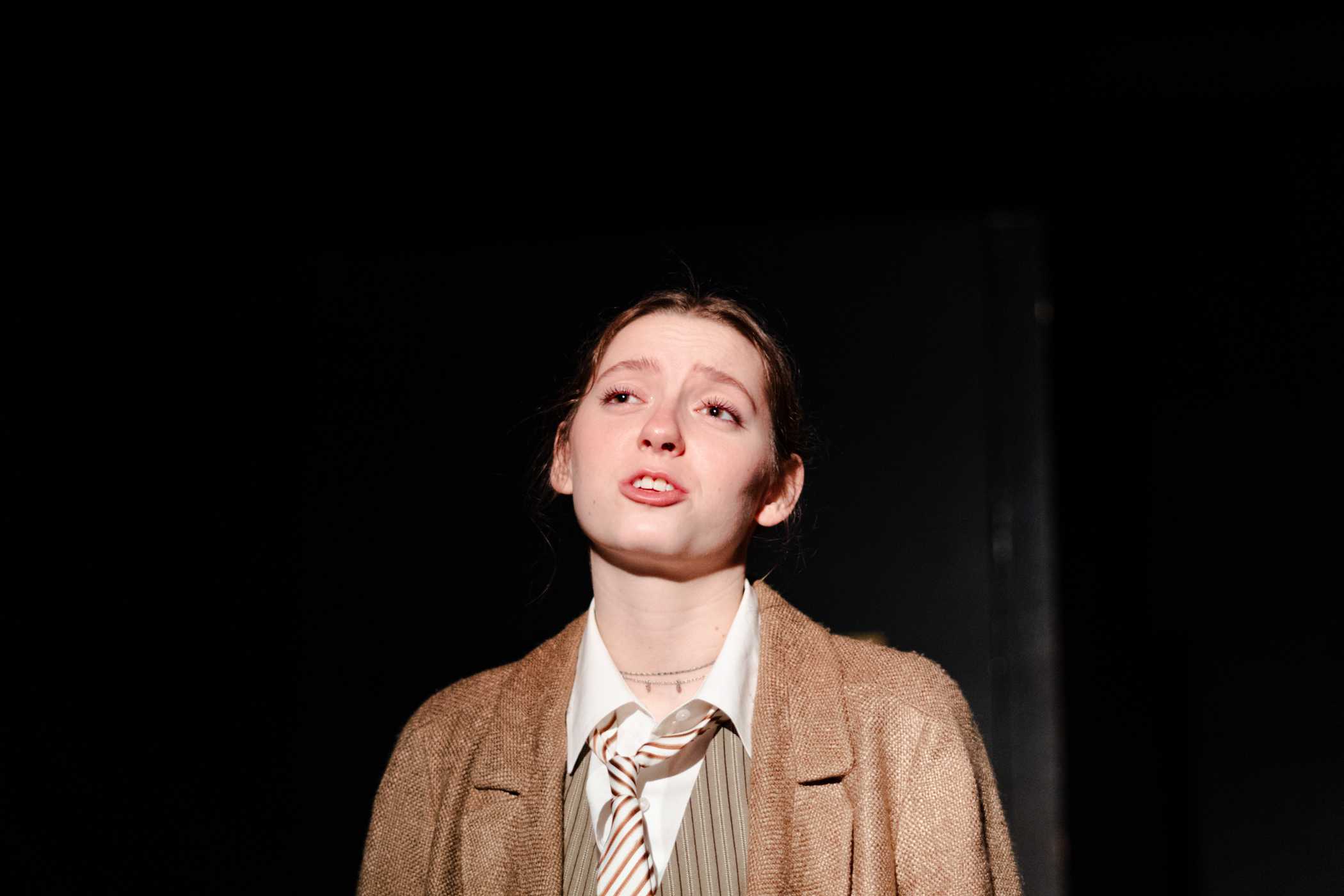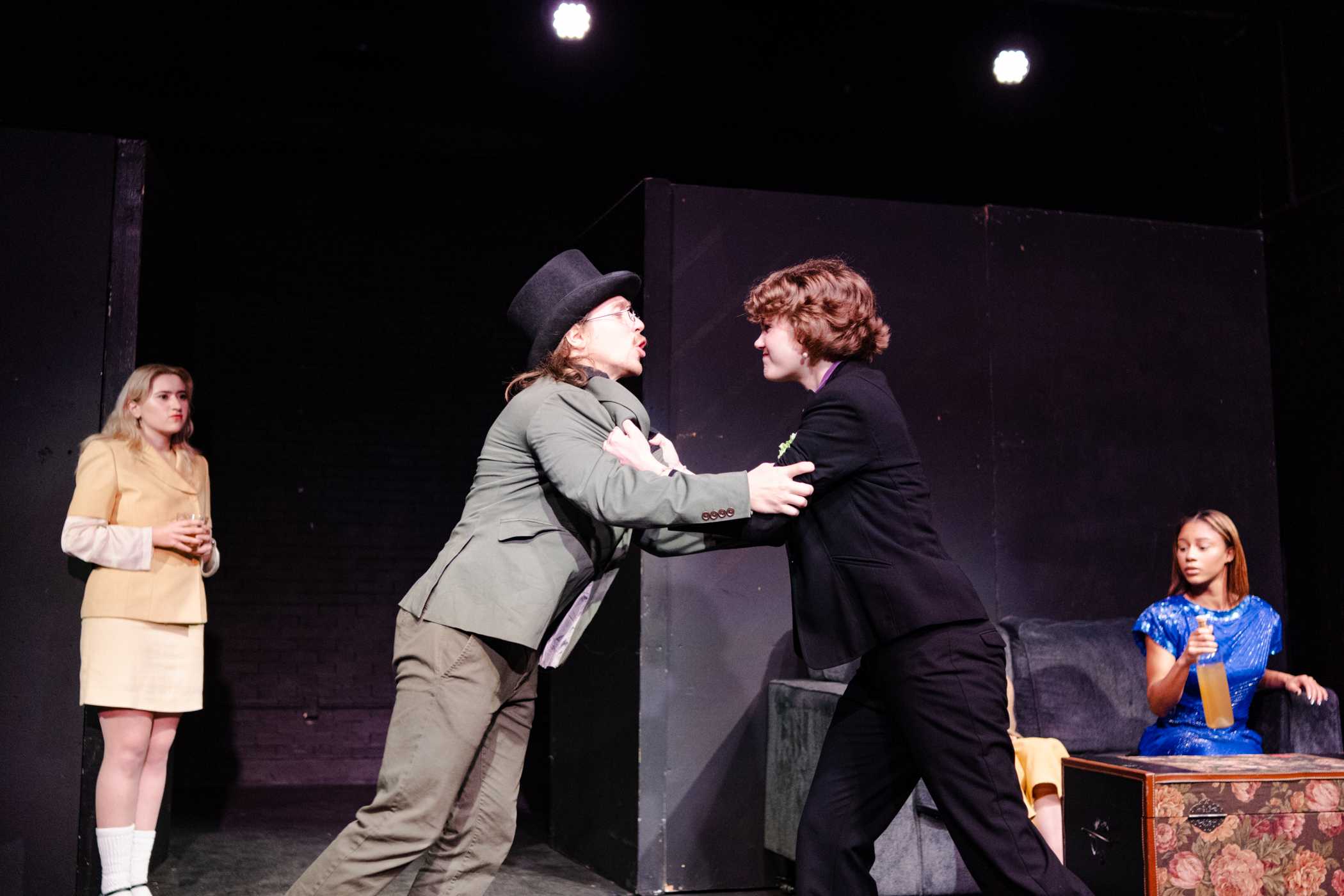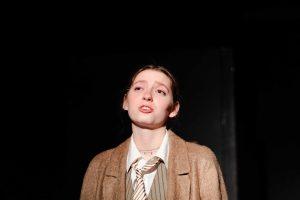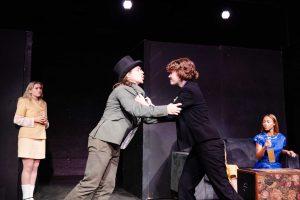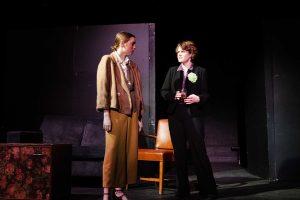From the twinkling lights hung overhead, to the live jazz music filling the Hopkins Black Box Theater, “Yearning” truly takes viewers back to the 1920s.
“Yearning” is play with an original script written and adapted by director and LSU graduate student, Seth Knievel, based on the novel “The Great Gatsby.” Knievel’s show ran from Feb. 28 – March 3. Knievel first became familiar with “The Great Gatsby” in high school, when he felt a personal connection to Gatsby through the shared experience of repressed identity.
“I really identified with the book because, essentially, Gatsby is upset because tradition and social norms are getting in the way of him having a fulfilling romantic life,” Knievel said. “As a closeted gay man, I felt the same way because this tradition of heteronormativity and a prejudice toward queer people is what was stopping me from coming out and having a fulfilling romantic life.”
Knievel chose to set the show in 1920s New Orleans and to centralize the story on women, moving away from the misogyny and homophobia in F. Scott Fitzgerald’s writing.
“One of the limitations of Gatsby and Fitzgerald’s work at large is that Fitzgerald was a virulent misogynist,” Knievel said. “I’ve read some of his letters, where he openly talks about how women are dull and how you couldn’t have a lead character as a woman because it wouldn’t read. I knew that I wanted to center women in the story.”
He said the decision to set the play in New Orleans was not only because of the city’s significance to Jazz, but also because of the religious connotations the Deep South holds.
“This show is about the religious rhetoric, which has been used as a weapon against queer people. The place where I see that happening most frequently is in the Deep South,” Kneievel said. “I wanted to put it in the Deep South to specifically call out the religious prejudice that seems to be festering here.”
The show changed the gender of many of the original characters, including the namesake, traditionally Jay Gatsby, who was altered to Jane. Leadership and human resource development junior, Ava Russell, portrayed the role of Jane Gatsby in the show.
“Gatsby is such a confident character and I’m more of a fake it ‘till you make it kind of person,” Russell said. “I really, really loved getting to know how to embody that confidence on stage. She taught me a lot.”
Russell emphasized the importance of depicting queer characters in a respectful and accurate manner. She also highlighted the challenges faced by queer individuals in the 1920s.
“At first, I kind of just described (the show) as a gender bent adaptation of ‘The Great Gatsby.’ This is so much more than that. It’s representation,” Russell said.
Working on the show was a collaborative effort between Knievel, his assistant director Krysta Overton, and the cast and crew. Sophie Rollins, anthropology junior, portrayed the older Nick Carraway in the show, also known as the narrator.
“I’ve done a good bit of theater in the past, but one thing that really stood out to me was how (Knievel) was treating us as peers,” Rollins said. “When he gave us the script, he made sure to tell us ‘If you need anything changed let me know.’”
Rollins wanted to ensure that while the play called out homophobia in the religious community, it also didn’t alienate those who are religious and LGBTQ+ allies.
“What I wanted to do was make sure we weren’t perpetuating an unnecessary dichotomy that alienates Christian allies and Christian LGBT people,” Rollins said. “We ended up together developing this narrative of, not every Christian is homophobic, but almost every queer person has suffered at the hands of religious hate. Which is an important distinction to make because you can be faithful and queer, and your relationship with religion and queerness doesn’t have to be mutually exclusive.”
Greyson Thompson, archaeology senior, was the prop master and in the ensemble for the show. Thompson personally connected to the show as a queer person and highlighted the importance of representation and inclusivity in society.
“Queer people have been around forever, especially in the ‘20s,” Thompson said. “To have a story that is as iconic and well known as ‘The Great Gatsby’ just in symbolism and iconography, then be told retold through a queer lens is really important to reframe history and tell the stories of queer people that didn’t get to be told.”
Thompson said that queer people being able to replace themselves in history where their history has been erased is extremely important.
“Seth putting on this show has been really important and I hope it’s the start of a trend of more queer history is being told,” Thompson said.
Knievel believes that art is a reflection of reality, and engaging with queer stories can offer insight into the experiences of queer people, even if the reader or viewer is not queer themselves.
“I think telling queer stories where queer people are celebrated is important, because there are people in the closet who need those stories,” he said. “There are people out of the closet who need those stories too. Seeing how other queer people respond to things is so useful, because many times the only examples that we have are for straight people.”
Knievel said its important to not let stories of queer people be scrubbed or erased from our reality
“When you put on a story that people are very familiar with, and you make those characters queer, they already know the story so, it allows them to focus a little bit more on the queerness of the character, which I think is the point,” he said.
After the show, there was a 20-minute question and answer session with the cast and crew. They discussed the labor of love that went into the performance, and how the show helped them understand the story better. Some also shared their experiences of coming out to their families and friends, and emphasized the importance of surrounding oneself with understanding people.
Junior horticulture major Cameron Beall portrayed the role of Tom Buchanan in the show. He said that there is a uniqueness in working in a different performance space like the Black Box.
“The intimacy of this space, whether in size, or whether with the people that you share this space with while we’re on stage, also translated into the intimacy that ended up turning into some of the most lifelong friendships,” Beall said.“I’ve done theater for years, and I’ve never done something that was so in your face as this. I’ve never been under the sturdy hand of somebody who was so collaborative. And I think that’s the beauty of this space. It’s not just a Black Box. It’s a canvas where people can come together and love, express their love and put on a damn good story.”


